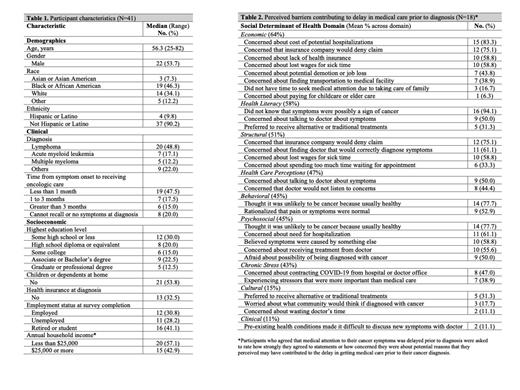Background:
Disparities in outcomes based on age, race, and socioeconomic status are well-established among patients with hematologic malignancies. Timely access to health care is essential for successful treatment of aggressive hematologic malignancies. Delays in receiving treatment have been linked to worse cancer outcomes in solid tumors and is presumed to lead to worse outcomes in hematologic malignancies. Memphis, owing to its geography, draws patients from Tennessee, Arkansas, and Mississippi for complex medical care. Patients at our institution frequently belong to underserved communities, including rural, impoverished, underinsured, and racial minority populations. In this exploratory study, we sought to characterize the potential structural and social barriers that patients in an underserved population with hematologic malignancies may face accessing oncologic care around the time of their cancer diagnosis.
Methods:
A cross-sectional survey was conducted to better understand potential barriers to accessing hematologic care in the greater Memphis area. The survey was developed through a review of existing literature on this topic (i.e., Anderson's conceptual model for healthcare utilization), as well as from the investigators' clinical experience treating cancer patients. Several components of social determinants of health (SDOH), including psychosocial, economic, health literacy, behavioral, health care perceptions, cultural, structural, environmental, clinical, and chronic stress domains, were queried in this 56-item survey. Most items were presented as closed-ended statements on a Likert scale. Response categories for analyses were collapsed into two levels (eg, “agree” for “somewhat” or “strongly”; “concerned” for “somewhat” or “very”). Descriptive statistics, including percentages, means, medians, and ranges, were used to characterize the sample.
Results:
A total of 41 out of 46 consented patients completed the survey (response rate: 89.1%). The median age of respondents was 56.3 years (Table 1). Most had lymphoma (48.8%), followed by acute myeloid leukemia (17.1%) and multiple myeloma (12.2%). The majority of respondents were male (53.7%) and Black or African American (46.3%). Over half of the sample reported an annual income of less than $25,000 (57.1%) and nearly a third were uninsured at the time of their cancer diagnosis (32.5%). Approximately 44% of respondents believed that medical attention to their cancer symptoms was delayed prior to their cancer diagnosis by a doctor. Of this subset, the majority attributed the delay to economic factors (64%), followed by health literacy (58%), structural (51%), healthcare perceptions (47%), behavioral (45%), psychosocial (45%), chronic stress (43%), cultural (15%) and clinical (11%) reasons (Table 2).
Conclusions and Implications:
To our knowledge, this is the first survey study to investigate the factors from a patient's perspective that contributed to delays in seeking care for hematologic malignancies. This pilot study establishes the feasibility of approaching an extremely underserved population about sharing their experiences accessing medical care around the time of their cancer diagnosis as well as participating in research. Along with already well-established economic, health literacy, psychosocial, and structural barriers, respondents endorsed that health care perceptions and chronic stress contributed almost equally to delays in seeking care. Cultural and clinical barriers contributed the least. Our study findings are limited by a skewed patient selection toward those who survived initial hospitalization and treatment and is not inclusive of the sickest patients in our patient population who experienced neglected cancer symptoms. A mixed-methods, focus-group based study is planned as the next step to substantiate these findings and allow us to gain a deeper understanding into the social disparities that most heavily impact this underserved population.
Acknowledgement of Funding:
This research was supported by the American Society of Hematology through the ASH HONORS Award.
Disclosures
Elsedawy:Vyriad: Patents & Royalties. Thota:Daiichi Sankyo: Membership on an entity's Board of Directors or advisory committees; Bristol Myers Squibb: Membership on an entity's Board of Directors or advisory committees; Alexion Pharmaceuticals: Membership on an entity's Board of Directors or advisory committees; Novartis: Membership on an entity's Board of Directors or advisory committees.


This feature is available to Subscribers Only
Sign In or Create an Account Close Modal